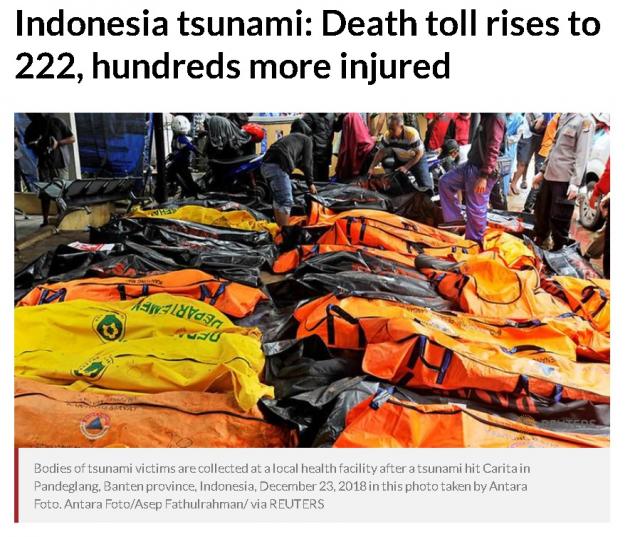Search the Community
Showing results for tags 'indonesia'.
-
Dow said it was recycling our shoes. We found them at an Indonesian flea market U.S. petrochemicals giant Dow Inc and the Singapore government said they were transforming old sneakers into playgrounds and running tracks. Reuters put that promise to the test by planting hidden trackers inside 11 pairs of donated shoes. Most got exported instead. At a rundown market on the Indonesian island of Batam, a small location tracker was beeping from the back of a crumbling second-hand shoe store. A Reuters reporter followed the high-pitched ping to a mound of old sneakers and began digging through the pile. There they were: a pair of blue Nike running shoes with a tracking device hidden in one of the soles. These familiar shoes had traveled by land, then sea and crossed an international border to end up in this heap. They weren’t supposed to be here. Five months earlier, in July 2022, Reuters had given the shoes to a recycling program spearheaded by the Singapore government and U.S. petrochemicals giant Dow Inc. In media releases and a promotional video posted online, that effort promised to harvest the rubberized soles and midsoles of donated shoes, then grind down the material for use in building new playgrounds and running tracks in Singapore. Dow, a major producer of chemicals used to make plastics and other synthetic materials, in the past has launched recycling efforts that have fallen short of their stated aims. Reuters wanted to follow a donated shoe from start to finish to see if it did, in fact, end up in new athletic surfaces in Singapore, or at least made it as far as a local recycling facility for shredding. To that end, the news organization cut a shallow cavity into the interior sole of one of the blue Nikes, placed a Bluetooth tracker inside, then concealed the device by covering it with the insole. The tracker was synched to a smartphone app that showed where the shoe moved in real time. Within weeks, the blue Nikes had left the prosperous city-state and were moving south by sea across the narrow Singapore Strait to Batam island, the app showed. Reuters decided to put trackers in an additional 10 pairs of donated shoes to see if wayward pair No. 1 had been a fluke. It wasn’t. None of the 11 pairs of footwear donated by Reuters were turned into exercise paths or kids’ parks in Singapore. Instead, nearly all the tagged shoes ended up in the hands of Yok Impex Pte Ltd, a Singaporean second-hand goods exporter, according to the trackers and that exporter’s logistics manager. The manager said his firm had been hired by a waste management company involved in the recycling program to retrieve shoes from the donation bins for delivery to that company’s local warehouse. But that’s not what happened to the shoes donated by Reuters. Ten pairs moved first from the donation bins to the exporter’s facility, then on to neighboring Indonesia, in some cases traveling hundreds of miles to different corners of the vast archipelago, the location trackers showed.
- 68 replies
-
- 19
-
.png)
-

-

-

-
https://www.straitstimes.com/singapore/social-development-network-wants-to-nudge-more-to-get-hitched
-
Marshall)http://www.reuters.com/article/idUSTRE69P0QN20101026
-
https://asia.nikkei.com/Business/Transportation/Indonesia-presents-China-made-high-speed-train-cars?utm_campaign=GL_asia_daily&utm_medium=email&utm_source=NA_newsletter&utm_content=article_link&del_type=1&pub_date=20221004123000&seq_num=5&si=44594 Indonesia presents China-made high-speed train cars Railway to connect Jakarta with Bandung; operations to start in June 2023 A total of 12 sets of eight-car trains, approximately 200 meters in length each, will be delivered in the future. KOYA JIBIKI, Nikkei staff writerOctober 3, 2022 21:48 JST JAKARTA -- Indonesia has presented in public the cars of the country's first high-speed train connecting the capital Jakarta with Bandung, a major city in West Java, with commercial operations expected to start in June 2023. The cars, presented to the media on Saturday, were manufactured by a company under China's state-owned train manufacturer CRRC. The covers on the cars were not removed throughout the event. The cars arrived at the port of Tanjung Priok in Jakarta in early September. A total of 12 sets of eight-car trains, approximately 200 meters in length each, will be delivered in the future, including those for inspection According to Kereta Cepat Indonesia China (KCIC), an Indonesia-China joint venture for the high-speed rail project, the cars consist of VIP seats, first- and second-class seats, and a dining car. With a maximum speed of 350 kilometers per hour, the new railway connects Jakarta and Bandung, a distance of about 142 km apart, in as little as 35 minutes, compared to 3.5 hours by the existing railway. There is a plan for Indonesian President Joko Widodo and Chinese President Xi Jinping to take a ride together for a test operation of the new railway in November. Xi is scheduled to attend the Group of Twenty (G-20) Summit in Bali the same month, which Indonesia will chair. Initially, Japan was considered a strong contender to win the order for Indonesia's high-speed railway project. However, Widodo adopted the Chinese proposal on condition that China would not require Indonesia to bear any financial burden. Nevertheless, the completion of the project has been pushed back from the original target of 2018 due to delays in land expropriation and the COVID-19 pandemic. Construction is approximately 90% complete, and the railway is expected to open in June 2023. The total construction cost exceeds the initial estimate of $5.5 billion. In October 2021, the Indonesian government reversed its previous plan and decided to invest government funds. The parliament is scrutinizing the amount of money needed.
-
If you're planning to travel, some things you might want to consider. Indonesia's Batik Air faces probe after pilots fall asleep mid-flight The Batik Air plane briefly veered off course but was able to land safely Indonesia is investigating local carrier Batik Air after both pilots were found to have fallen asleep for 28 minutes mid-flight. The two men - who have both been temporarily suspended - fell asleep during a flight on 25 January from Sulawesi to the capital Jakarta. One of them was reportedly tired from helping care for his newborn twins. The Airbus A320 briefly veered off course but landed safely, with all 153 passengers and crew members unharmed. The 32-year-old pilot had told his co-pilot to take control of the aircraft about half an hour after take off, saying he needed to rest. The 28-year-old co-pilot agreed, according to a report from the transport ministry. But the co-pilot inadvertently fell asleep as well. According to the report, he had been helping his wife look after their one-month-old twin babies. Jakarta air traffic control tried contacting the cockpit of the Batik Air A320 after their last recorded transmission but received no response. That radio silence lasted 28 minutes until the lead pilot woke up and realised that his co-pilot had also fallen asleep. He also found that the aircraft had briefly veered off course. The pilots then responded to calls from Jakarta and landed the plane safely. Medical tests before the flight deemed that the men were fit to fly. Their blood pressure and heart rate were normal and alcohol tests came back negative. But while the pilots appeared to be fully rested, the tests failed to determine whether the quality of their rest was good, aviation expert Alvin Lie told BBC Indonesian. Authorities have now "strongly reprimanded" Batik Air over the incident, with Indonesia's head of air transport, M Kristi Endah Murni, saying that Batik Air should pay more attention to their crew's rest time. Batik Air has said it "operates with adequate rest policy" and that it was "committed to implement all safety recommendations". In 2019, the same airline was forced to have an emergency landing after the pilot fainted. Aviation regulations in most countries require at least two pilots to be present in the cockpit of commercial airliners.
-
To protect the consumer or business owner (and government coffer)? I hope Singapore and other countries will no follow suit. I cannot imagine how much more we need to pay for the same items without competition online (e-commerce and sales via social media). As consumer, we have to exercise due diligences when making purchase online, instead of relying on our givernment to protect us from being scammed. Source: https://www.channelnewsasia.com/asia/indonesia-ban-sale-goods-tiktok-shop-social-media-regulation-commerce-3802491 SINGAPORE: For the past two months, factory worker Subairi has come to rely on TikTok Shop to purchase his daily necessities. From baby formula to cooking oil, he stocks up on these items each payday. But with the announcement that the Indonesian government has banned the direct sales of goods on social media platforms, Mr Subairi - who like many Indonesians go by one name - is worried over the loss of a cheaper shopping alternative. “If TikTok Shop is banned, I will find it difficult to find items that are as cheap as (those sold there),” the 38-year-old from Karawang, West Java told CNA. “On other e-commerce platforms, the service fee is almost 10,000 rupiah (US$0.64) but on TikTok Shop it is totally free, with no conditions.” Mr Subairi added that the flash sales and payday promotions - normally offered at the end of the month when workers receive their salaries - on TikTok Shop make the prices much cheaper. He has been comparing prices of goods across various e-commerce platforms, and found those sold on TikTok Shop to be the cheapest. “Yesterday, I bought baby formula. Elsewhere, the cheapest price was 320,000 rupiah but on TikTok, with various discounts, I could get (the formula at) around 300,000 rupiah,” said the father of two. Meanwhile, TikTok Shop buyer Nadya Aulia Arma told CNA that while she disagrees with the new regulation, she will accept the development and switch to using other e-commerce platforms. “I honestly don't agree, because I will lose a place to buy things at low prices. But if it's for the good of the Indonesian people, that's okay. I'll go back to shopping on Shopee,” she said. On Monday (Sep 25), the Indonesian government announced that it will no longer allow social media platforms to double as e-commerce sites, in order to prevent the misuse of data. "(Social media) can only (be used to) facilitate the promotion of goods or services (but) direct transactions … (and) direct payments are no longer allowed; (social media) can only be used for promotion," said Trade Minister Zulkifli Hasan after a closed meeting on electronic commerce issues. Under the Revised Ministry of Trade Regulation, a minimum import transaction of US$100 will also be imposed on goods purchased from abroad. While the ban has caught the disappointment of buyers, some sellers at physical stores in Indonesia have celebrated the move. Textile seller Iyal Suryadi told CNA that the sale of goods online has reduced his income. “In the local market where we sell our goods, sometimes we only sell one or two pieces of cloth in a week … If it continues like this, don’t even think about growing (the business); just being able to survive is good,” he said. He added that the prices of items sold on TikTok Shop “do not make sense”. “They sell goods at factory prices directly to consumers, not to distributors or resellers. It is true that we have entered the free market, but let's not go too far. “The government must act if it does not want the country's economy to be destroyed. The reason is that the money in this country revolves around the small people like us, not the rich,” said Mr Suryadi, who owns a shop at Pasar Cipeundeuy located in Subang, West Java. Similarly, Mr Raden, a seller at Tanah Abang market in Jakarta, agreed that TikTok Shop has hurt his sales due to the cheap prices offered on the social media platform. However, he told CNA that he disagrees with the new ban and suggested that the sale of items through social media be restricted instead. “(This is) because there are merchants here who also sell through TikTok. They are forced to sell on TikTok because the physical market is starting to be abandoned by buyers,” said Mr Raden, who goes by one name. “In my opinion, TikTok shops should not be banned but restricted. (Instead), foreign products should be stopped and domestic products should be sold.” In response to the ban, TikTok Indonesia said that it will abide by the laws and regulations of the country. "However, we also hope that the government will consider the effect (of the ban) toward the livelihood of six million local sellers and around seven million creator affiliates that use TikTok Shop," a TikTok Indonesia spokesperson was quoted as saying by Tempo on Tuesday. The platform, owned by China's ByteDance, reportedly said that it has received complaints from local sellers and has asked for certainty from the authorities regarding the newly issued regulation. According to Tempo, TikTok said that social commerce emerged as a solution to the problems faced by micro, small and medium enterprises (MSMEs), adding that it believes that TikTok Shop was established to support local sellers to collaborate with local creators in order to boost traffic for their online shops. TikTok has been hit with allegations that its TikTok Shop service is implementing predatory pricing by selling imported goods at significantly lower prices, thus leading to major profit losses for MSMEs who struggle to compete with such prices. Mr Dedi Dinarto, lead Indonesia analyst at public policy advisory firm Global Counsel, told CNA that Indonesia is the first Southeast Asian country to implement regulations prohibiting social media companies from simultaneously operating as e-commerce platforms. “TikTok is expected to be the most affected, as TikTok Shop currently allows Indonesian buyers to make direct purchases within the app, whereas platforms like Facebook, Instagram, and WhatsApp lack built-in transaction features,” he said. However, he noted that small vendors who have benefited from TikTok Shop can still use any social media platforms to advertise their products, even though transactions will now need to be arranged separately between buyers and sellers. “Engaging in transactions outside of the apps may be considered risky, and this will place established e-commerce platforms such as Shopee, Lazada, and Tokopedia as more trusted options for online purchases,” said Mr Dinarto. Meanwhile, speaking to CNA, Jakarta-based economist Bhima Yudhistira from the Center of Economic and Law Studies (CELIOS) said that banning social commerce is just a partial step to help SMEs. “The government also needs to monitor illegal imports through airplane passengers - such as through a service known as Jastip - and also support SMEs by lowering lending rates, increasing domestic purchasing power, and government procurement absorption of SME products,” said Mr Yudhistira. Jastip allows buyers to obtain items available overseas by contracting the services of travellers who can buy and deliver the goods in their travels.
- 21 replies
-
- 5
-

-
.png)
-

-
- social media
- ban
- (and 4 more)
-
- 14 replies
-
- 4
-

-

-

-
https://asia.nikkei.com/Business/Transportation/Indonesia-high-speed-railway-still-beset-by-problems?utm_campaign=GL_asia_daily&utm_medium=email&utm_source=NA_newsletter&utm_content=article_link&del_type=1&pub_date=20230213123000&seq_num=6&si=44594 Indonesia high-speed railway still beset by problems Safety, profitability and accessibility issues haunt $6bn China-led project Trials of Indonesia's high-speed railway, which can operate at speeds of up to 360 kph, are scheduled to begin at the end of May. © Reuters KOYA JIBIKI, Nikkei staff writerFebruary 11, 2023 12:01 JST JAKARTA -- Indonesia's planned high-speed rail project, an integral part of China's Belt and Road initiative, is raising fresh concerns about its safety, profitability and accessibility. Scheduled to start service in July, a month later than planned, the 142-kilometer-long railway will connect the capital Jakarta with Bandung in West Java province. In mid-December, a maintenance train and locomotive derailed at a construction site near Bandung, killing two Chinese workers and spurring concerns about the safety of high-speed rail in the country. It was the first fatal accident involving the line. A senior Indonesian government official said there was a problem with the locomotive's brake and that human error could also have played a part in the accident. Both Jakarta and Beijing said that the accident poses no threat to the safety of high-speed rail in Indonesia. Both governments stressed that the accident was caused by the maintenance vehicle and that the locomotive imported from China escaped major damage. Kereta Cepat Indonesia China (KCIC) -- the consortium running the project, which is funded by state-owned railway operator Kereta Api Indonesia (KAI) and other organizations -- resumed construction before findings of the government investigation into the accident were released. The president of KAI told reporters on Jan. 28 that the railway's opening will be postponed until July. Some have voiced doubts that the line will open in July. Construction work is only 84% complete with some railway track still not laid, according to KAI. Trial runs of the high-speed line, which will operate at up to 360 kilometers per hour, are scheduled to start around the end of May. But even if all goes well, meeting the July deadline will be difficult, based on Japanese standards. An executive of a Japanese trading house who has experience in overseas railway projects said that data collected during the trials will be important. Trials must run at maximum speed after which the positions of tracks are adjusted -- sometimes in millimeters. Testing and verifying overseas rail projects backed by Japan takes at least a year, according to a Japanese government official. Billboards at construction sites in Bandung, West Java are often written in Indonesian and Chinese. (Photo by Koya Jibiki) Another concern is profitability. The Indonesian government initially tried to adopt Japan's bullet train for the project, but in 2015 switched to a Chinese proposal that did not involve funding by the Indonesian government. It was decided that 75% of the construction cost would be funded by loans from China Development Bank with the remainder coming from KCIC. Construction began in January 2016 with completion set for 2018. But overly optimistic estimates about acquiring land needed for construction pushed the finish date back. In addition, construction costs have swelled well past the initial estimate of $5.5 billion, forcing the Indonesian government to inject more than 7 trillion rupiah ($462.1 million) into the project. A KCIC official in December told parliament that the consortium has requested the government to extend its operating rights to 80 years from the initial 50. The group plans to eventually transfer all rights to the government but said that it will take more time to recoup investment due to the delays and ballooning costs. KCIC has set the Jakarta-Bandung fare at 250,000 rupiah, saying that the price strikes a fair balance between profitability and usability. The company plans to keep fares for the line only about 20% higher than that of KAI limited express trains to attract riders. Meanwhile, some observers think the project does not align with President Joko Widodo's plan to relocate the nation's capital to East Kalimantan province on the island of Borneo. Others raise the question of the new line's accessibility in Bandung, noting that the terminal is too far from the city center. Passengers will have to board a different train when traveling between the Bandung terminal and the central district -- adding nearly 20 minutes to the 36-minute ride from Jakarta. It still shaves considerable time off existing train service, but the inconvenience may irk some passengers. Despite the problems, the government is rumored to be thinking about converting all existing KAI lines between Jakarta and Bandung into high-speed rail. But some users have already voiced opposition, saying that speed is not the most important aspect of travel between the two cities, as they prefer more leisurely journeys to enjoy the view along the route. The Indonesian government has floated the idea of extending the new railway to the country's second-largest city Surabaya in East Java province. Japan plans to help Indonesia make existing medium-speed trains between Jakarta and Surabaya faster through official development assistance, but some Japanese government officials remain skeptical of the plan. Additional reporting by Bobby Nugroho
-
what a tragedy, it's just a game ! 174 die as tear gas triggers crush at Indonesia soccer match MALANG, Indonesia (AP) — Panic and a chaotic run for exits after police fired tear gas at an Indonesian soccer match to drive away rampaging fans left at least 174 dead, most of whom were trampled upon or suffocated, making it one of the deadliest sports events in the world. Attention immediately focused on the police use of tear gas, which is banned at soccer stadiums by FIFA. The president of the world soccer body called the deaths at the stadium “a dark day for all involved in football and a tragedy beyond comprehension,” while President Joko Widodo ordered an investigation of security procedures. Violence broke out after the game ended Saturday evening with host Arema FC of East Java’s Malang city losing to Persebaya of Surabaya 3-2. Disappointed with their team’s loss, thousands of supporters of Arema, known as “Aremania,” reacted by throwing bottles and other objects at players and soccer officials. Witnesses said fans flooded the Kanjuruhan Stadium pitch and demanded that Arema management explain why, after 23 years of undefeated home matches against rival Persebaya, this one ended in a loss. The violence spread outside the stadium where at least five police vehicles were toppled and set ablaze. Riot police responded by firing tear gas, including toward the stadium's stands, causing panic among the crowd. Some suffocated and others were trampled as hundreds of people ran to the exit to avoid the tear gas. In the chaos, 34 died at the stadium, including two officers, and some reports include children among the casualties. “We have already done a preventive action before finally firing the tear gas as (fans) began to attack the police, acting anarchically and burning vehicles,” East Java police chief Nico Afinta said in a news conference early Sunday. More than 300 were rushed to hospitals but many died on the way and during a treatment, Afinta said.
- 46 replies
-
- 11
-

-

-

-
A 65-year-old wealthy Indonesian man married a 19-year-old woman in May 2022. The 46-year age gap between the bride and groom became the talk of the town in Indonesia, where it was reported that the dowry paid by the man was some 500 million rupiah (S$46,535). The groom, Haji Sondani, also bought his bride, Fia Barlanti, a house and a car. The couple got married on May 18 in West Java, Indonesia, according to Indonesia media reports. However, the pair have since divorced, according to Malay Mail. The exact reason for the divorce was not disclosed, but speculation was rife barely two weeks into the marriage that the woman did not fancy her husband. She was seen publicly behaving in a manner that appeared cold towards him. Haji and Fia were seated side by side in front of their house for a recitation that was publicly recorded and witnessed by many others, but they did not appear close. Fia's body language, it was observed, was a far cry from her initial disposition towards her husband when they first became man and wife. At one point, she was seen playing with her phone and even shielded her face, as if embarrassed. MCFers, if it's too good to be true, that's because it probably is.
-
In the comfort of SG safe environment, it's easy to forget that we're still surrounded by rabid extremists.
-
https://asia.nikkei.com/Spotlight/Asia-Insight/Indonesia-and-Philippines-face-persistent-anti-vax-hurdle?utm_campaign=GL_asia_daily&utm_medium=email&utm_source=NA_newsletter&utm_content=article_link&del_type=1&pub_date=20210914190000&seq_num=17&si=44594 Indonesia and Philippines face persistent anti-vax hurdle Asian hesitancy weighs as inoculation drives make progress AKANE OKUTSU, CLIFF VENZON and ERWIDA MAULIA, Nikkei staff writersSeptember 14, 2021 06:00 JST TOKYO/MANILA/JAKARTA -- The number of people in Asia getting vaccinated against COVID-19 has been rising. But further progress in battling the pandemic could be slowed by the continuing appearance of social media hoaxes and disinformation that make it harder to combat hesitancy. Some of the uglier postings have been in Indonesia, which says it has found and had taken down 2,000 vaccine-related hoaxes on social media platforms. One posting in July showed five coffins in a mosque, with a deliberately-wrong caption saying they contained residents of one house who just got vaccinated. In an earlier hoax, an Indonesian TV report quoting a scientist was manipulated so captions had him saying "our people will be killed by Chinese vaccines" and that jabs "make the virus more savage" -- which was completely different from what he was saying. Before Facebook took it down, the post received 11,000 "likes" and was shared 182,000 times. Last month in the Philippines, the Health Department debunked a video -- which went viral on Facebook -- by a "Doc Ron" who asserted that Pfizer's COVID-19 vaccine contains HIV particles. That too was taken down. Japan too has been hit by misleading social media posts. In the first seven months of 2021, as many as 110,000 Twitter posts that were retweeted at least once suggested that getting vaccinated leads to infertility, Nikkei's research found. A health worker tends to a coronavirus disease (COVID-19) patient in the chapel of Quezon City General Hospital turned into a COVID-19 ward amid rising infections, in Quezon City, Metro Manila on Aug. 20. © Reuters In many Asian countries, governments and experts are trying to find ways to communicate more effectively with the public and -- where there are anti-vax efforts -- to knock them down. There have been some improvements, but it's proving difficult to crush vaccine hesitancy. This is part of the reason there's a long way to go to get vaccination levels high enough to resume most normal activities and travel. A 31-year-old mother of one in Japan's Kanagawa Prefecture, south of Tokyo, is an example of the hesitancy that the government has not been able to eradicate. She and her husband are aware that the health ministry and other public institutions insist there is no evidence that getting vaccinated is harmful for pregnant women. Still, the woman -- who is not pregnant -- refuses to get COVID-19 shots. "Because we want a second child, my husband and I decided we would not get vaccinated," she said. In her view, the vaccines were "just developed, and I am worried that something might happen in a few years, even if there was no [worrying side-effect] for now." Many younger people in Japan are yet to take the vaccines. Based on its research in Tokyo and surrounding areas in July, a government expert committee found that only 45% of people in their 20s and 30s were either already vaccinated or wanted to be, compared with 60% for those in their 40s and 50s. According to the committee, it is ideal to vaccinate 75% of the younger group, and 80% for the older one. Japan, which just rolled out its vaccination program this year, had fully vaccinated half of its population. It has done well with seniors, fully vaccinating about 88%. Government leaders and experts have been desperately trying to convince the still reluctant, especially among Japan's young. "There are false rumors that the COVID-19 vaccine makes people infertile, but various institutions around the world are saying that [rumor] is totally not true," Taro Kono, a minister who's in charge of the vaccination program, told a major youth fashion event, Tokyo Girls Collection, on Sept. 4. "I hope you will take [the vaccines] with no such fear," he said. His tweet about TGC was liked 20,000 times. All parts of the world have varying degrees of vaccine hesitancy, and some have found that the percentage of a nation's people vaccinated starts to plateau after reaching 50% to 70%. As of early September, about 40% of people in the U.S. haven't had any jabs, according to Our World in Data. About 30% still have not been vaccinated in the UK and Israel. In the Philippines, where 15.4% were fully vaccinated as of Sept. 12, a survey by Pulse Asia in June showed that 43% of respondents said they wanted to be vaccinated, 36% said they didn't, and the rest were undecided or had been vaccinated. This was an improvement from a February poll, which showed only 16% willing to be vaccinated while 61% were not. Sometimes, minds do change. "Before, I didn't want to be vaccinated, because of news that some people died after being vaccinated," Kathlyn Marcos, a 31-year-old Manila cashier, told Nikkei Asia after receiving her first shot of Sinovac. She was the last to be vaccinated in her family, which eventually convinced her to get it. A medical worker injects a dose of COVID-19 vaccine in Indonesia on Sept. 6. A survey found 60% of respondents either "less willing" or "very unwilling" to get a jab. © Getty Images In Indonesia, 15.4% of the population was fully vaccinated by Sept. 12. Factors slowing progress include some delays in delivery and distribution of the vaccines, but there's also coolness to vaccinations. A survey released by Jakarta-based pollster Indikator Politik Indonesia on Aug. 25 found 60% of respondents were either "less willing" or "very unwilling" to get a jab, half of whom cited worry about unknown side-effects. Disinformation about vaccines is not new, according to Shinichi Yamaguchi, an associate professor at International University of Japan who researches social media and fake news. Vaccination involves technical knowledge, causing some people to feel anxious because of their lack of understanding. And drivers of fake news being shared are anger or anxiety, according to Yamaguchi. "Anyone can be fooled, regardless of age or gender," he told Nikkei Asia. Countering fake news is a challenge for the government, especially when political confidence is low. Amid Japan's recent surge of COVD-19 new cases, support for Prime Minister Yoshihide Suga's government dropped to the 30% range in July for the first time since its inauguration in September 2020. (Suga later announced he will not seek reelection in ruling Liberal Democratic Party's presidential election on Sept. 29.) Lack of trust in the government creates a breeding ground for conspiracy theories and fake news, said Yamaguchi, adding "Unless there's trust in the government, the vaccination rate will not become high." According to research published in the medical journal Lancet in 2020, Japan in 2018 was among the countries with the lowest vaccine confidence in the world even before the pandemic. Another survey by Imperial College London as of August also shows Japan is lagging behind the U.K. and the U.S. in building strong trust in COVID-19 vaccines. Japan has had some bitter experiences with vaccines and drugs. One major setback was when the government lost when defending against lawsuits that made side-effect claims for measles, mumps and rubella (MMR) vaccines. As a result, Japan stopped requiring MMR vaccines in 1993 and made such vaccinations non-mandatory in 1994. Since 1994, attitudes of the health ministry toward vaccines "have always been passive," said Akihiko Saitoh, a professor of pediatric medicine at Niigata University. Vaccination is now an individual choice, and "the power of the government recommendation is not as [strong] as in the US," he said. Also, the Japanese government has been sued by more than 100 recipients of human papillomavirus (HPV) vaccines against cervical cancer, which are widely used globally. The class-action case, filed in 2016, remains in court. Women in face masks walk in the famous Shibuya crossing in Tokyo. Many young people in Japan are yet to get vaccinated against COVID-19 . (Photo by Ken Kobayashi) Kensuke Yoshimura, president of an educational project called Cov-Navi that provides information to the public on COVID-19 vaccines, said Japan's vaccine policies "had repeated failures, especially for communication," and that the HPV vaccines scare indicated "the ultimate example of failure." Indonesia, the country with the largest Muslim population, historically has seen some resistance to medicines on the basis they were not certified as halal, or acceptable for Muslims. In August 2018, the Indonesian Ulema Council (MUI) issued a fatwa (edict) saying that the MMR vaccine was "forbidden" because of the use of pork or derivatives in its production, but that the use of the vaccine itself was "permissible" because of Islamic law's leniency in emergency situations. For COVID-19, the government involved MUI from the beginning in its vaccination drive. In January, the council declared Sinovac, which was the first vaccine used and accounts for the bulk of doses administered in Indonesia so far, as halal. Indikator Politik said that in its poll, 4% of respondents said they either didn't believe or were unsure if government-provided vaccines were halal. Indonesia's Communications Ministry, in addition to finding and getting social media platforms to take down hoaxes, has been fact checking against problematic contents and publishing counternarratives regularly on its website. In May, it launched a national digital literacy program to educate the public not to easily trust information spreading on the internet. In the Philippines, unfounded allegations that a dengue vaccine caused the death of children grabbed headlines a few years ago, fueling skepticism on vaccines for a time. Another issue in the Philippines for COVID-19 is higher trust in Western-made vaccines than Chinese ones which dominate the country's supply. The bias forced the government in May to stop announcing in advance the brands that will be administered in vaccination centers. Philippine President Rodrigo Duterte holds a vial of Sinovac Biotech's CoronaVac in February. © Reuters Confidence in COVID-19 vaccines improved after a government's information campaign on vaccine effectiveness regardless of the brand. Doctors received Sinovac jabs on national TV, while President Rodrigo Duterte's inoculation with a jab of China-made Sinopharm vaccine was also publicized. (Duterte has threatened to jail people who didn't get vaccinated, but it hasn't happened.) For Yoshimura of the Cov-Navi project in Japan, the key to battling COVID-19 is getting people accurate, easy-to-understand information. Yoshimura, who is also a professor at Chiba University Hospital, launched the project with other experts to educate the medical workers and Japan's general public, communicating information backed by peer-reviewed academic reports and public institutions. He added that efforts must be made to educate youths in their teens, or even younger and their parents. Vaccine hesitancy is not the sole obstacle to accelerate inoculation drive. There is still more to be done about making vaccines available for those who are wanting to get one. In Japan, vaccination at some universities and companies was put on hold due to lack of supply. A new vaccination site set up for young people under 39 years old at the end of August in Tokyo's Shibuya district was overcrowded on its first day, before the site started to accept online bookings. Vaccines are believed to be effective for preventing severe symptoms that require extra care in hospitals. "No matter how much the number of beds increases and capacity expands, the main plug must be closed," said Cov-Navi's Yoshimura. Combined with social distancing and border control, "vaccination would be the most effective" measure for fighting COVID-19, he said.
-
https://asia.nikkei.com/Spotlight/Coronavirus/Indonesia-overtakes-India-to-become-Asia-s-COVID-epicenter?utm_campaign=GL_asia_daily&utm_medium=email&utm_source=NA_newsletter&utm_content=article_link&del_type=1&pub_date=20210713192000&seq_num=5&si=44594 Indonesia overtakes India to become Asia's COVID epicenter Southeast Asia's largest economy reports new daily record of 47,899 new cases An intensive care unit worker conducts a medical check on a COVID-19 patient at Bogor City Hospital, Indonesia on June 23. © EPA/Jiji ERWIDA MAULIA, Nikkei staff writerJuly 13, 2021 19:15 JST JAKARTA -- Indonesia has overtaken India as Asia's new epicenter for the coronavirus pandemic, with daily infections exceeding 40,000 for two straight days and officials warning that the delta variant is spreading outside the most populous island of Java. Southeast Asia's largest economy on Tuesday reported 47,899 new infections, a record high, up from 40,427 the previous day. India's cases, meanwhile, dropped to 32,906 from 37,154. More alarming is that despite having more daily infections, Indonesia's population of 270 million population is just a fifth of India's. Indonesia now has around 132 cases per million people, compared with India 26 as of Sunday, according to ourworldindata.org. While the daily death toll on Tuesday was less than half India's 2,020, Indonesia's per capita count is higher -- average 3 per million people, compared with less than one in the south Asian country. The figures do not take into account Indonesia's poor record of testing and tracing. The Southeast Asia's case positivity rate -- the percentage of confirmed infections vs people tested -- has hovered around 30% over the past week, while the figure for India's 2%. Cumulatively, India's confirmed coronavirus tallies are still the highest in Asia with 30.9 million cases and 410,784 deaths as of Tuesday, followed by Indonesia with 2,615,529 cases and 68,219 deaths. People receive Covishield vaccines at a government hospital in Noida, a suburb of New Delhi, on Monday. © AP But while India's figures keep falling from a May peak, Indonesia's worst outbreak since the beginning of the pandemic is not yet showing any signs of slowing down. Health Minister Budi Sadikin said Tuesday that bed occupancy rates for COVID-19 patients in 12 provinces have exceeded 70% -- half of them on Java and the rest on other major Indonesian islands. In the nation's capital, Jakarta, the occupancy rate is close to 90% despite the recent conversion of some facilities into hospitals just for the coronavirus. Sadikin said the government is preparing for a scenario where cases could increase 30% over the next two weeks and accelerate in other regions. Steps include converting more regular hospital beds into treatment facilities for COVID-19. The government earlier this year designated 30% of 400,000 hospital beds nationwide for COVID-19 treatment, but they have quickly been filling up following the Eid holiday exodus in May and as the more contagious delta strain spreads across the country. "Nationwide there are still [beds], but cases in several provinces are very high already because of uneven outbreaks of the delta variant," Sadikin told a hearing with lawmakers. "[Delta cases] are still concentrated in Java, but we've seen them spreading outside Java -- Lampung, East Kalimantan, South Sumatra, West Papua, Riau Islands and Bengkulu are now under our radar." Sadikin also spoke of shortages of health workers, oxygen and COVID-19 medications. Also Tuesday, the Japanese government will support special flights for Japanese nationals wishing to return from Indonesia, Chief Cabinet Secretary Katsunobu Kato told reporters in Tokyo, "From the viewpoint of protecting Japanese nationals, we have decided to take measures... so that Japanese people who wish to return can return to Japan as soon as possible, and as many people as possible," he said. "Japanese residents are planning to return to Japan tomorrow via a a special flight by a Japanese airline, which the government will support. After that, we plan to make similar efforts in response to requests from Japanese residents," he added. Additional reporting by Shotaro Tani in Jakarta
-
https://asia.nikkei.com/Spotlight/Coronavirus/COVID-vaccines/Hundreds-of-Sinovac-injected-Indonesian-doctors-contract-COVID?utm_campaign=GL_coronavirus_latest&utm_medium=email&utm_source=NA_newsletter&utm_content=article_link&del_type=10&pub_date=20210618123000&seq_num=15&si=44594 Hundreds of Sinovac-injected Indonesian doctors contract COVID Dozens hospitalized as concerns rise over efficacy against more virulent strains A medical worker prepares a dose of the Sinovac vaccine before giving it to a doctor at a facility in Jakarta, Indonesia, on January 19, 2021. © Reuters June 17, 2021 17:36 JST JAKARTA (Reuters) -- More than 350 Indonesian doctors have contracted COVID-19 despite being vaccinated with Sinovac, and dozens have been hospitalized, officials said, as concerns rise about the efficacy of some vaccines against more virulent virus strains. Most of the doctors were asymptomatic and self-isolating at home, said Badai Ismoyo, head of the Kudus district health office in Central Java, but dozens were in hospital with high fevers and declining oxygen saturation levels. Kudus is battling an outbreak believed to be driven by the more transmissible Delta variant which has pushed bed occupancy rates above 90% in the district. Designated as a priority group, Indonesian health care workers were among the first to be vaccinated when the inoculation drive started in January. Almost all have received the COVID-19 vaccine developed by Chinese biopharmaceutical company Sinovac, according to the Indonesian Medical Association (IDI). While the number of Indonesian health care workers dying from COVID-19 has decreased significantly -- dropping from 158 deaths this January to 13 this May, according to data initiative group LaporCOVID-19 -- public health experts say the Java hospitalizations are cause for concern. "The data shows they have the Delta variant [in Kudus] so it is no surprise that the breakthrough infection is higher than before because as we know the majority of health care workers in Indonesia got Sinovac, and we still don't know yet how effective it is in the real world against the Delta variant," said Dicky Budiman, an epidemiologist from Australia's Griffith University. A spokesperson from Sinovac and Indonesia's ministry of health were not immediately available for comment on the efficacy of Sinovac's CoronaVac against newer coronavirus variants. Grappling with one of the worst outbreaks in Asia, with more than 1.9 million cases and 53,000 deaths, there has been a heavy toll on Indonesia's doctors and nurses with 946 deaths. Many are now experiencing pandemic fatigue and taking an increasingly laissez-faire approach to health protocols after being vaccinated, said Lenny Ekawati, from LaporCOVID-19. "That phenomenon happens quite often these days, not only within the community but also health care workers," she said, "They think because they are vaccinated that they are safe." But as more cases of the highly transmissible Delta variant are identified in the world's fourth most populous nation, the data is starting to tell a different story. Across Indonesia, at least five doctors and one nurse have died from COVID-19 despite being vaccinated, according to the data initiative group, although one had only received their first shot. In Kudus, one senior doctor has died, said IDI, although it is understood he had a comorbidity. In the Indonesian capital Jakarta, radiologist Dr Prijo Sidipratomo told Reuters he knew of at least half a dozen doctors in the city who had been hospitalized with COVID-19 in the past month despite being vaccinated, with one currently being treated in ICU. "It is alarming for us because we cannot rely on vaccinations only," he said, urging people to strictly adhere to health protocols. Weeks after the Muslim Eid Al-Fitr holidays, Indonesia has experienced a surge in cases, with the positivity rate exceeding 23% on Wednesday and daily cases nearing 10,000, the highest since late February. In its latest situation report the World Health Organization called for Indonesia to implement a stricter lockdown with increased transmission due to variants of concern and a "drastic increase in bed occupancy rates" necessitating urgent action.
-
https://static.straitstimes.com.sg/s3fs-public/styles/article_pictrure_780x520_/public/articles/2021/04/21/yq-indosub-21042021.jpg?itok=pBsrZJ4q×tamp=1619005528 Indonesia searching for missing submarine with 53 on board The KRI Nanggala-402 was conducting a torpedo drill in waters north of Bali when it went missing.PHOTO: PUSAT PENERANGAN TNI/FACEBOOK Updated2 hours ago JAKARTA (REUTERS, AFP) - Indonesia’s navy is searching for a submarine with 53 people on board that went missing on Wednesday (April 21) and is seeking help from neighbouring Australia and Singapore in the hunt, the Indonesian military chief told Reuters. The German-made submarine, KRI Nanggala-402, was conducting a torpedo drill in waters north of the island of Bali but failed to relay the results as expected, a navy spokesman said. “We are still searching in the waters of Bali, 60 miles (96km) from Bali, (for) 53 people,” military chief Hadi Tjahjanto told Reuters in a text message. The military chief confirmed that assistance in the search for the submarine and missing crew members had been sought from Australia and Singapore. He said that contact with the vessel was lost at 4.30am on Wednesday. Singapore's submarine support vessel MV Swift Rescue, usually manned by a 27-person crew, departed from Changi Naval Base on Wednesday afternoon. The 1,395-tonne KRI Nanggala-402 was built in Germany in 1978, according to the Indonesian Cabinet secretariat’s website, and underwent a two-year refit in South Korea that was completed in 2012. Indonesia in the past operated a fleet of 12 submarines purchased from the Soviet Union to patrol the waters of its sprawling archipelago. But now it has a fleet of only five, including two German-built Type 209 submarines and three newer South Korean vessels. Indonesia has been seeking to upgrade its defence capabilities but some of the equipment that are still in service are old. In recent years, there have been deadly accidents involving, in particular, ageing military transport planes. According to a statement by the Indonesian Ministry of Defence, which is monitoring the search for the missing submarine, an aerial surveillance by a helicopter at 7am (8am Singapore time) had found an oil spill around the initial dive site. The missing boat “had asked for permission to dive at 3am (Jakarta time). After being granted a dive permit according to the procedure, the boat lost contact and could not be contacted”, said the statement. Two navy vessels have since been deployed to assist in the search using side-scan sonar, it added. The ministry said: “Several countries have responded and are ready to provide assistance, including the Singapore Navy, the Australian Navy and the Indian Navy.”
-
I got a friend who has to fly Garuda (due to timing and location) for a business trip and he is worried about the airline. I do not know much but it Garuda dangerous? Will you fly?
-
Parents in Indonesia give toddler 5 glasses of coffee every day because they're too poor to buy milk https://www.asiaone.com/asia/parents-indonesia-give-toddler-5-glasses-coffee-every-day-because-theyre-too-poor-buy-milk?xtor=EREC-16-4[Emarsys_Newsletter]-20190919&extid=6934d0cfb7b252f1ae9f0dbddf5ff88ca8637e77 At first glance, Khadijah Haura looks just like any other toddler her age. At 2 years old, she is capable of walking on her own and actively plays to a point that her parents could not find the time to sleep. What sets her apart from many other kids, however, is that she has been consuming coffee instead of milk since she was 6 months old. Khadijah's parents, Sarifuddin and Anita -- residents of Tonro Lima village in Polewali Mandar, West Sulawesi, had no other choice but feed their daughter with five glasses, equal to 1.5 liters, of kopi tubruk, or brewed coffee. Anita and her husband, who worked as copra peelers, said they could not afford to buy milk given that their daily income of Rp 20,000 (S$2) could barely cover their expenses. "We can't do anything else. Our income is not enough to buy milk. We're forced to feed her coffee every day. She can't even sleep if she doesn't drink coffee; she'd cry asking for it before sleep," Anita told reporters at her house on Saturday, as reported by kompas.com. Both Anita and Sarifuddin said they solely relied on peeling copra for a living, besides helping lift rice from the fields during harvest season, through which they could earn some more money. On their lucky days, Anita and her husband could earn up to Rp 40,000 per day from peeling copra, but that was only if there were coconuts to be processed into copra. Otherwise, they would have to rest at home until there were enough coconuts to be processed. Anita couldn't help but express her concerns over her daughter's health, adding that she had never received milk or nutrition assistance from the local health agency. Polewali Mandar Health Agency's community health development head Mandaria Saleh said the agency had run a health check up on the toddler and found no abnormality in her growth and development. She noted, however, that the caffeine and sugar intake could harm the toddler in the long run. "We've asked the parents and the family of Khadijah not to continue with the coffee consumption. The health agency has distributed milk and complementary food assistance such as biscuits so that Khadijah could drink milk again and grow healthily like others her age," Mandaria said.
-
Indonesia picks area on Borneo island as site of new capital: Widodo Read more at https://www.todayonline.com/world/indonesia-picks-area-borneo-island-site-new-capital-widodo Indonesian President Joko Widodo said moving Indonesia's capital from Jakarta would cost 466 trillion rupiah (S$45.49 billion). JAKARTA — Indonesia plans to move its capital to Borneo island from Jakarta, a crowded, polluted city on the north coast of Java island which is slowly sinking, the president said on Monday (Aug 26). President Joko Widodo said it was urgent that relocation plans commence, although the capital would not physically begin to be relocated until 2024 The new capital, which does not yet have a name, would be located in Borneo's East Kalimantan province, near the existing Samarinda City and the port city of Balikpapan, important for coal and oil shipments. "It is a strategic location at the centre of Indonesia, close to growing urban area," Mr Widodo told a news conference at the Jakarta state palace. Mr Widodo said moving the capital would cost 466 trillion rupiah (S$45 billion), of which the state would fund 19 per cent, with the rest from public-private partnerships and private investment. The price tag includes new government offices and homes for about 1.5 million civil servants. The president had earlier this month proposed to parliament to move the country's administrative centre to Kalimantan, the Indonesian side of Borneo island, a region known for rainforests, coal mines, orangutans and home to just over 16 million people. Environmentalist groups, however, have expressed fears that building a new capital amid swaths of forests in Borneo could imperil the habitats of endangered wildlife. The jungle island is home to numerous endangered species, including orangutans, sun bears and long-nosed monkeys. Jakarta is one of the world's most densely populated cities, home to more than 10 million people and three times that number when counting those who live in surrounding towns. The city is prone to floods and is sinking due to subsidence, caused by millions of residents using up groundwater. Mr Widodo said the burden on Jakarta and Java island was already too heavy, with the island home to 54 per cent of the 260 million population and generating 58 per cent of Indonesia's gross domestic product. The government will submit a bill, and the result of a feasibility study, to parliament soon to obtain approval for the new capital, Mr Widodo said. Planning Minister Bambang Brodjonegoro said land acquisition would start in 2020. Indonesia is not the first South-east Asian country to move its capital. In 2005, Myanmar's ruling generals moved to Naypyidaw, a town in hills some 320km away from the colonial era capital, Yangon. In the 1990s, Malaysian leader Mahathir Mohamad built an administrative capital in Putrajaya, about 33km from Kuala Lumpur. Read more at https://www.todayonline.com/world/indonesia-picks-area-borneo-island-site-new-capital-widodo
-
https://www.channelnewsasia.com/news/asia/indonesia-to-start-building-7km-bridge-linking-bintan-and-batam-11711862 Interesting that Indonesia is doing so to maximise transport connectivity to Bintan offered by Changi Terminal 5, currently under construction. Just sharing. Safe ride Cheers
- 44 replies
-
- 4
-

-
- linkbridge
- batam
- (and 5 more)
-
WTF, count votes count until die, the condition there must be real bad!!! https://www.straitstimes.com/asia/se-asia/318-election-officials-die-more-than-2000-ill-after-indonesias-mammoth-single-day-poll JAKARTA - Kindergarten teacher Tursina Maya's days were packed on and around the election on April 17, the biggest single day poll held anywhere in the world and one of the most complicated with 240,000 candidates running for office. For the first time ever, Indonesians were simultaneously taking part in presidential as well legislative polls. A day ahead of the poll, Ms Tursina and her neighbours, who were tasked to manage their polling station in North Jakarta, held meetings, set up a tent, desks and instruction signs. They worked tirelessly from morning to midnight. On D-day, she continued working the clock, administering to voters before proceeding to the more daunting task of counting ballots. The next day, the 42-year-old mother ended up in hospital and had to be warded for four nights because of exhaustion and elevated blood pressure. She was, however, luckier than Abdul Rohim, 40, a security officer assigned to a polling station in Bekasi, West Java. He was admitted to an Intensive Care Unit (ICU), suffering from exhaustion and heart pain. He died subsequently. As at 8am on Tuesday (April 30), 318 polling station committee officials have died and 2,232 fell ill, said the general election commission (KPU), which oversaw the polls. Related Story More than 300 election workers, police officers in Indonesia die of exhaustion Related Story Indonesia urged to review polls after over 100 election workers, police die of exhaustion Related Story Indonesia election microsite: Read more stories "Many of them had to stay up through two nights and not while they had coffee to watch football games, but while they were under pressure amid efforts of ensuring there was no miscounting," said Mr Pramono Ubaid Tantowi, a KPU commissioner, on Tuesday. After polls closed on April 17, ballots were first manually counted at more than 800,000 polling stations. The counting at many polling stations lasted until past midnight and officials then had to oversee the transport of ballot boxes to collection points, which were plagued with long queues, adding to delays. The results of the polling stations were then tallied at the sub-district, district and provincial offices before ending up in the national vote tally in Jakarta. Election officials were tasked to monitor closely each stage of the counting process. A normal person would be able to work hard for eight straight hours and then stay awake for the following eight hours before he has to get six hours' sleep, Mr Pramono said, citing medical doctors. Under the existing election law, manual vote counting at a polling station must be completed within the same day (midnight deadline) and a Supreme Court decree stipulates it could be extended for 12 hours conditionally but without any break in the vote-counting period, Mr Pramono noted. "I started my day around 5am and wrapped up around the same time the next day," said Ms Tursina, stressing that staying up all night working was the part that caused her physical stamina to drop. After finishing vote counting at around midnight, she oversaw the transport of ballot boxes to a collection point until 3am. She recalled that in the last election in 2014, when the legislative poll was held a few months earlier ahead of the presidential one, manual vote counting mostly finished by 5pm. Mr Abdul Rohim's widow, Madam Masnun, 38, said her husband felt exceptionally tired after the Wednesday polls and rested at home. He was rushed to a clinic on Friday and died on the subsequent Wednesday (April 24). "On Monday (April 22) he said he felt pain on the chest. Then he did not speak at all until Wednesday," Ms Masnun told reporters on the sidelines of a seminar in Jakarta held by Ombudsman Indonesia. The seminar was the beginning of a study of the 2019 election by the independent agency overseeing public services in the country.
- 13 replies
-
- 4
-

-
- election office die
- indonesia
-
(and 2 more)
Tagged with:
-
According to a recent poll conducted by Soegeng Sarjadi Syndicate, who specialize in surveys about Indonesian political moods - an overwhelming majority - some 80.7 percent of the country, believe that Indonesia can become the next
-
Indonesia tsunami: Death toll rises to 222, hundreds more injured JAKARTA: Indonesia's disaster agency said 222 people were dead and hundreds more injured after a tsunami struck coastal areas around the Sunda Strait between the islands of Sumatra and Java on Saturday (Dec 22) night. "222 people are dead, 843 people are injured and 28 people are missing," Indonesia's national disaster agency spokesman Sutopo Purwo Nugroho said on Sunday evening. "This number is predicted to increase because not all victims have been successfully evacuated, not all health centres have reported victims and not all locations have got complete data." He said that all the casualties were Indonesian citizens, with no foreign national casualties reported. The victims and damage occurred across four affected districts, namely in the Pandeglang, Serang, South Lampung and Tanggamus regencies, he added. Hundreds of buildings were destroyed by the wave, which hit the coast of southern Sumatra and the western tip of Java about 9.30 pm (1430 GMT) following the eruption of a volcano known as the "child" of the legendary Krakatoa, national disaster agency spokesman Sutopo Purwo Nugroho said. Read more at https://www.channelnewsasia.com/news/asia/tsunami-indonesia-168-dead-beaches-volcano-krakatoa-11057318 https://www.youtube.com/watch?time_continue=4&v=4WEoMHe_fHA
- 8 replies
-
- 2
-

-
- indonesia tsunami
- tsunami
-
(and 2 more)
Tagged with:
-
The maid thread reminded me that my previous maid had left some of her old stuff with me. About 40kg. She was a solid maid. High recommended. I wanna send it back to her on the cheap. DHL says $454 . $454 will defintely exceed the value of the items. Any ideas? time is of no concern.
-
http://english.alarabiya.net/en/News/world/2014/12/28/AirAsia-flight-from-Indonesia-to-Singapore-missing.html hope nothing serious............




















